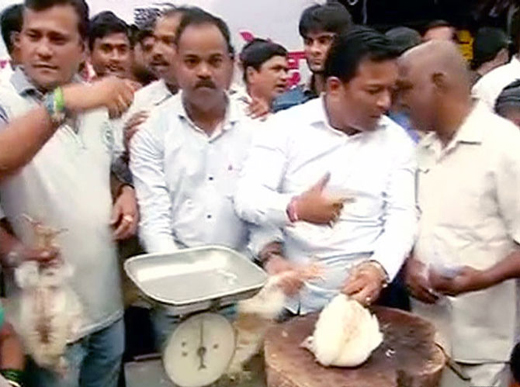Meat ban: Sena, MNS hit streets, HC sounds critical note
www.mangaloretoday.com
Mumbai, Sep 10, 2015: The wrangling over the ban on sale of meat during the Jain fasting period ’Paryushan’ escalated today with Shiv Sena and Maharashtra Navnirman Sena (MNS) hitting the streets against it even as the Bombay High Court took a critical view of the step noting it will not be feasible in a metropolitan city.

The Raj Thackeray-led MNS set up a stall to sell chicken meat at busy Dadar area as a symbolic protest while Shiv Sena workers tore off notices put up by Municipal Corporation of Greater Mumbai declaring the ban on meat by for four days - September 10, 13, 17 and 18, when members of the Jain community observe religious fast.
A similar ban has also been clamped on neighbouring Mira-Bhayander and Navi Mumbai municipal corporations. While the BJP defended the ban, its ally Shiv Sena as well as opposition MNS and Congress and the NCP have slammed it, dubbing the move as a BJP ploy to polarise voters and appease a section of society before the crucial MCGM polls in early 2017.
Shiv Sena chief Uddhav Thackeray said his party would ensure that there was no ban on sale of meat. MNS leaders said they will continue the protest by setting set up meat stalls across the city on all the days of the ban.
BJP leaders, however, defended the ban arguing that this had been there for long and it was wrong to blame the party-led state government. Seeking response of the state and the civic body on a plea of Bombay Mutton Dealers Association, a Division Bench of the High Court said imposing a ban on animal slaughter and sale of meat for four days is not feasible in a metropolitan city like Mumbai.
"Mumbai is a metropolitan city. Such straight ban on meat cannot be a formula. Ban is on slaughter and sale of the meat. What about other sources? What about packaged meat that is already available in the market?" the bench headed Justice Anoop M asked.
The court, while posting the matter for hearing tomorrow, suggested if the Jain community had a problem with animals being slaughtered in the open and displayed in shops, a direction can be issued against that.
The petitioners claimed that the decision is unconstitutional as it affects the livelihood of a section of people and favours a small percentage of population. They also contended that it goes against the secular fabric of Constitution.
- Pope Francis laid to rest. Humble funeral draws world leaders, massive crowds
- Two booked for abusing, misbehaving with doctor on duty at hospital in Puttur
- Udupi-Bengaluru private bus catches fire in Mandya; passengers safe
- Vittal: Decomposed body of Paltaje resident found in isolated spot
- We are in favor of peace, Union Govt must strengthen security measures says Siddaramaiah
- 3 Pak women residing in City Police Commissionerate limits
- All-religion meet pays homage to late Pope Francis
- Pahalgam attack: DK Congress holds candle light vigil
- Tirthahalli student Deeksha scores 600/600 in II PU after revaluation, tops science stream in Karnataka
- Kudremukh trekking circuits to reopen from May 1
- Two medical students of Tiruchi SRM Medical College drown in Arabian Sea at Gokarna
- KS Hegde Hospital achieves landmark success with three complex Carinal Resection Surgeries for lung cancer
- Mangaluru: Facebook page booked for supporting Pahalgam massacre; probe underway to trace admin
- 280 injured, several feared dead after explosion tears through Iran’s Bandar Abbas port
- Two ATM robbers shot at in Kalaburagi
- Blood will flow if India stops river water, Bilawal Bhutto threatens
- Not a drop of water to Pakistan, says Jal Shakti Minister
- Ranya Rao charged under anti-smuggling law, to be detained for year: Sources
- Houses of 5 terrorists across J&K razed days after Pahalgam attack
- Strong message from UN Security Council after Pahalgam terror attack
- Pakistan continues unprovoked firing along LoC; Indian Army responds
- Kashmir on high alert after intel warns of terror plots targeting non-locals, rail network
- Supreme Court pulls up Rahul Gandhi over Savarkar remark, stays HC order
- Former ISRO chief K Kasturirangan passes away in Bengaluru
- Identify all Pakistanis in India, send them back: Amit Shah to Chief Ministers
- Skills and Competencies Take Center Stage at MSN Dialogue Series
- Court remands Maoist Lakshmi to six-day police custody
- Sandhya Shenoy honored with Society for Materials Chemistry Medal-2024
- White Cornus Apartment in Mangaluru
- City girl wins first place in state-level spell bee competition
- Alleged ‘Love Jihad’ Case in Mangaluru: Woman left home voluntarily, says police
- Girl fatally struck by reckless two-wheeler near Belman
- New residential complex for the judges inaugurated in Mangaluru
- Absconding accused nabbed after 8 years
- Truck with cylinders turns turtle in Beltangady
- Bhoota Kola artist dies of cardiac arrest
- Development of the country should be our goal: Ganesh Karnik
- Container truck gets stuck under Modankap railway bridge
- Truck crushes bike’s pillion rider near BC Road
- Head constable dies of heart attack
- CITY INFORMATION
- TRAVEL
- TOURIST INFORMATION
- HEALTH CARE
- MISCELLANEOUS




 Write Comment
Write Comment E-Mail To a Friend
E-Mail To a Friend Facebook
Facebook Twitter
Twitter  Print
Print 


